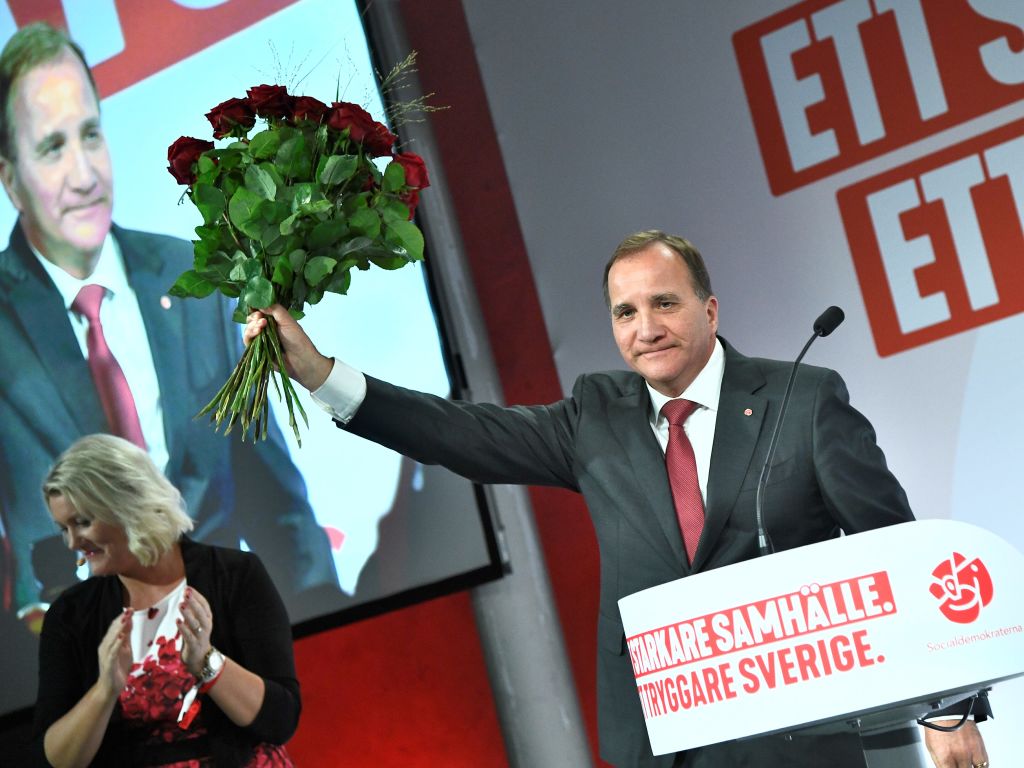Sweden headed toward gridlock after far-right party gains seats in parliamentary elections


A free daily email with the biggest news stories of the day – and the best features from TheWeek.com
You are now subscribed
Your newsletter sign-up was successful
Sweden's ruling center-left Social Democratic Party won the greatest share of votes in Sunday's parliamentary elections but just barely, winning about 28.4 percent. The Social Democrats' ruling coalition earned a combined 40.6 percent of the vote, for about 144 seats in the 349-seat Riksdag, or Parliament, while the center-right Alliance coalition, led by the Moderates, got 40.3 percent, for about 142 seats. The biggest gain was by the far-right, anti-immigrant Sweden Democrats, who got 17.6 percent of the votes, for about 63 seats, from 12.9 percent and 49 seats in the 2014 election.
Both the center-left and center-right coalitions reiterated after the vote that they won't form a government with the Sweden Democrats, but it's unclear how either bloc will put together a working majority. Moderates leader Ulk Kristersson called on Prime Minister Stefan Lofven (pictured) to resign, but Lofven refused Sunday, telling supporters that "all good forces" in Sweden "have a moral responsibility" to solve the country's problems together. "A party with roots in Nazism," he added, referring to the Sweden Democrats, would "never ever offer anything responsible, but hatred."
Sweden Democrats leader Jimmie Akesson declared victory, even though his party fell short of expectations. The party has made steady gains amid concerns over immigration — Sweden took in 163,000 asylum seekers in 2015, the most per capita of any European country — and like other resurgent far-right parties in Europe, The Associated Press says, "the Sweden Democrats worked to soften its neo-Nazi image in the lead-up to the election. The party symbol was switched from a flame thrower to a flower. Members known for making pro-Third Reich statements were pushed out."
The Week
Escape your echo chamber. Get the facts behind the news, plus analysis from multiple perspectives.

Sign up for The Week's Free Newsletters
From our morning news briefing to a weekly Good News Newsletter, get the best of The Week delivered directly to your inbox.
From our morning news briefing to a weekly Good News Newsletter, get the best of The Week delivered directly to your inbox.
A free daily email with the biggest news stories of the day – and the best features from TheWeek.com
Peter has worked as a news and culture writer and editor at The Week since the site's launch in 2008. He covers politics, world affairs, religion and cultural currents. His journalism career began as a copy editor at a financial newswire and has included editorial positions at The New York Times Magazine, Facts on File, and Oregon State University.
-
 The 8 best TV shows of the 1960s
The 8 best TV shows of the 1960sThe standout shows of this decade take viewers from outer space to the Wild West
-
 Microdramas are booming
Microdramas are boomingUnder the radar Scroll to watch a whole movie
-
 The Olympic timekeepers keeping the Games on track
The Olympic timekeepers keeping the Games on trackUnder the Radar Swiss watchmaking giant Omega has been at the finish line of every Olympic Games for nearly 100 years
-
 Judge orders Washington slavery exhibit restored
Judge orders Washington slavery exhibit restoredSpeed Read The Trump administration took down displays about slavery at the President’s House Site in Philadelphia
-
 Hyatt chair joins growing list of Epstein files losers
Hyatt chair joins growing list of Epstein files losersSpeed Read Thomas Pritzker stepped down as executive chair of the Hyatt Hotels Corporation over his ties with Jeffrey Epstein and Ghislaine Maxwell
-
 Judge blocks Hegseth from punishing Kelly over video
Judge blocks Hegseth from punishing Kelly over videoSpeed Read Defense Secretary Pete Hegseth pushed for the senator to be demoted over a video in which he reminds military officials they should refuse illegal orders
-
 Trump’s EPA kills legal basis for federal climate policy
Trump’s EPA kills legal basis for federal climate policySpeed Read The government’s authority to regulate several planet-warming pollutants has been repealed
-
 House votes to end Trump’s Canada tariffs
House votes to end Trump’s Canada tariffsSpeed Read Six Republicans joined with Democrats to repeal the president’s tariffs
-
 Bondi, Democrats clash over Epstein in hearing
Bondi, Democrats clash over Epstein in hearingSpeed Read Attorney General Pam Bondi ignored survivors of convicted sex offender Jeffrey Epstein and demanded that Democrats apologize to Trump
-
 El Paso airspace closure tied to FAA-Pentagon standoff
El Paso airspace closure tied to FAA-Pentagon standoffSpeed Read The closure in the Texas border city stemmed from disagreements between the Federal Aviation Administration and Pentagon officials over drone-related tests
-
 Judge blocks Trump suit for Michigan voter rolls
Judge blocks Trump suit for Michigan voter rollsSpeed Read A Trump-appointed federal judge rejected the administration’s demand for voters’ personal data
